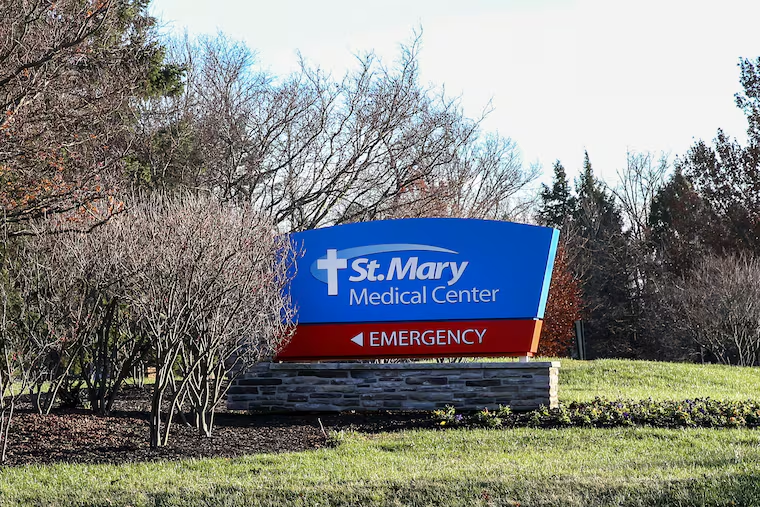St. Mary Medical Center gave a brain-bleed patient twice the needed drug due to medical error
A patient was prescribed more than twice the necessary amount of the anti-blood clot medication after her weight was incorrectly entered as 125 kilograms instead of 125 pounds.

A patient being treated for a brain bleed at St. Mary Medical Center last fall was given more than twice the necessary amount of an anti-blood clot medication after a nurse incorrectly reported their weight.
The patient’s weight of 125 pounds was reported as 125 kilograms — the equivalent of 275 pounds — in a pharmacy order for enoxaparin, an anticoagulant that is dosed based on patient weight. The mistake drew one of the Pennsylvania Health Department’s harshest warnings for the 373-bed Langhorne hospital. Inspectors say nursing staff there failed to follow medication protocol, creating potentially life-threatening safety gaps. It’s unclear what happened to the patient, but medical experts said that an overdose of the anticoagulant could put a patient at significant risk of severe bleeding.
Hospitals, including St. Mary Medical Center, have strict protocols to avoid such mistakes. Nurses must weigh patients immediately before ordering medications that are dosed based on the patient’s weight. Under standard protocol, hospitals are supposed to weigh patients as soon as possible after they’re admitted, and not rely on patients to report their own weight.
Incorrect patient weights commonly contribute to dosage mistakes, despite a decades-long push from safety agencies, such as the Institute for Safe Medication Practices, for hospitals to standardize how and when they record this information.
“It’s always a system issue,” said Daniel Abazia, director of Rutgers’ Medication-Use Safety and Information Center, who is not involved in the St. Mary case. “It’s never just one thing that fails.”
Pennsylvania hospitals reported just over 45,000 medication errors in 2023, up 12% from the year before, according to data submitted by hospitals across the state to the Patient Safety Authority, a state agency that monitors serious safety events. Of those cases, 294 were considered serious events, meaning a patient died or was injured and required additional care.
The most recent 2023 PSA report does not break down how many medication errors are related to incorrect weights. But the agency has been tracking the link since at least 2009, when it analyzed hundreds of medication errors related to incorrect weights. In 2016, PSA looked at another 1,200 medication errors related to incorrect patient weight that were reported by hospitals across the state, and found that nearly a quarter were due to confusion between metric and pound weights.
St. Mary Medical Center’s sister hospital, Mercy Fitzgerald Hospital in Darby, is being sued by a patient who was left paralyzed and unable to speak after receiving a muscle paralytic instead of the COVID-19 medication prescribed. Both hospitals are owned by Trinity Health Mid-Atlantic.
In response to the October incident, St. Mary Medical Center updated its policies to require that each patient’s weight be checked twice and set its electronic medical record to prevent medication requests from being filled without adding a new weight.
“At St. Mary Medical Center, patient safety is our highest priority, and we take any safety incident extremely seriously,” Jason Griffith, a spokesperson for Trinity Health Mid-Atlantic, said in a statement. “While privacy laws prevent us from sharing specific details, we want to assure the community that the well-being of our patients is at the heart of everything we do.”
He declined to say what happened to the patient or the nurse who made the mistake.
» READ MORE: A hospital mistake almost killed him
Botched medication order
Enoxaparin, or Lovenox, is commonly used at hospitals among patients who must be confined to bed, as inactivity puts them at greater risk for developing a blood clot, said Talitha Pulvino, a clinical associate professor at Temple University’s School of Pharmacy. She is not involved in the St. Mary case.
The drug, administered by injection into the abdomen, helps prevent blood clots by thinning the blood. But too much could lead to severe bleeding, if the patient had an existing bleeding injury or hurt themselves while on the medication, Pulvino said.
The St. Mary Medical Center patient had been admitted Oct. 1 for a “right-sided frontal acute subdural hematoma,” a type of severe head injury with internal bleeding typically caused by a fall, car accident, or blow to the head.
» READ MORE: Nine months of inspections at St. Mary Medical Center: January to September
Health department inspectors found that a nurse broke hospital protocol two days later by failing to weigh the patient before ordering enoxaparin. Instead, the nurse gave the pharmacy a weight recorded when the patient was admitted to the emergency department.
The nurse reported the patient’s weight of 125 pounds as 125 kilograms — the equivalent of 275 pounds.
The pharmacy sent an internal message to the patient’s care team asking them to double check that the weight was correct.
“The nurse replied with a ‘yes’ but the facility determined a weight was not obtained,” inspectors wrote in the report.
The inspection report does provide details about the patient, such as their age or gender, and does not describe their medical treatment — including whether they were previously prescribed a blood thinner and what happened when they received an excessive dose.
Preventing weight-related medication errors
Consistently recording accurate patient weights has been a challenge at hospitals for years, said Abazia, a clinical associate professor at Rutgers who specializes in medication and patient safety.
Life-threatening medical problems often take precedent when a patient arrives through the emergency department, and busy staffers may unintentionally put off gathering basic details like weight, he said.
Pennsylvania’s Patient Safety Authority studied about 1,200 cases in which incorrect weight contributed to a medication error between 2008 and 2015.
Confusion between pounds and kilograms was the second-most common mistake, accounting for some 300 medication errors during that time.
Enoxaparin was incorrectly administered in 8% of the cases, second only to heparin, another anticoagulant.